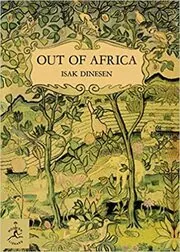Out of Africa Summary
Author: Isak Dinesen
This page offers our Out of Africa summary (Isak Dinesen's book). It opens with an overview of the book, and follows with a concise chapter-by-chapter summary.
Drafted with AI assistance and reviewed by a human editor.
As an Amazon Associate, we earn from qualifying purchases (at no extra cost to you).
This book has 1 recommender!
Overview
The narrative unfolds on a farm in Africa, nestled at the foot of the Ngong hills outside Nairobi, now known as Kenya. This high-altitude terrain, spanning six thousand acres, is partly used for coffee cultivation, while the rest encompasses forests and living spaces for the local people. The farm is inhabited primarily by the Kikuyu tribe, who earn their stay through their labour on the land. Other African tribes, including the Swahilis, the Masai, and the Somalis, occupy the neighbouring areas. Farah, a Somali, is the chief servant who assists the Danish narrator, subtly referred to as "Baroness Blixen" and "Tania," manage the farm.
The narrator is deeply engaged with the locals in her farm, providing education and medical care. She operates an evening school and offers medical assistance, including treating a young boy named Kamante, who later becomes the farm's chef. Various incidents occur on the farm, such as an accidental shooting by a native boy, resulting in compensation with livestock after intense discussions with the Kikuyu Chief, Kinanjui. The farm also welcomes numerous visitors, ranging from Europeans in Nairobi, natives attending traditional dances or Ngomas, and an Indian high priest. Her close friends, Berkeley Cole and Denys Finch-Hatton, frequent the farm, sharing hunts and possibly a romantic relationship, although it's not explicitly stated.
Despite painting her African farm life as an ideal, the narrator's story concludes with a tragic note. Her coffee farm goes bankrupt due to the challenges of high-altitude cultivation. Unable to settle her debts, she sells the farm to a foreign firm intending to convert the land into a residential area. Following this, her friend, Denys Finch-Hatton, dies in an airplane crash and is buried on the Ngong Hills, his grave later adorned with an obelisk narrating the "Rime of the Ancient Mariner." As she prepares to leave Africa, the narrator arranges for the relocation of the natives from her farm to a portion of the Kikuyu Reserve, and bids farewell to her friends after disposing of her possessions.
Edited by
Software engineer whose passion for tracking book recommendations from podcasts inspired the creation of MRB.
Lead investor at 3one4 Capital whose startup expertise and love for books helped shaped MRB and its growth.







Comments
Did we miss something? Have feedback?
Help us improve this page by sharing your thoughts